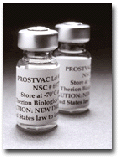
![]()
 Pancreatic Cancer Pancreatic CancerPancreatic cancer affects over 30,000 people in the U.S. annually as determined by the American Cancer Society. Current treatments include surgery, chemotherapy and radiation. Unfortunately, pancreatic cancer is difficult to control with available therapies. Over 30,000 deaths are attributed to pancreatic cancer each year in the U.S.
Therion�s PANVAC-VF� Vaccines
|
|
||||||||||
|
PRODUCT CANDIDATES
PANVAC-VF - Therion is developing PANVAC-VF as a lead candidate to treat pancreatic cancer. This lead product builds from previous clinical results of a prototype CEA vaccine that in Phase I/II clinical trials demonstrated encouraging survival data in late stage cancer patients. Five of nine patients treated with sequential vaccinations not only showed increased immune responses, but also remained alive two years out compared to zero long-term survivors in other treatment groups. This translates to a 60-80% survival at two years, compared to control. The study�s principal investigator, John Marshall, M.D., of Georgetown University Medical Center, presented this data at the 2001 American Society of Clinical Oncology (ASCO) meeting. To read the full press release, please click here.
Marshall, ASCO 2001
Hodge, et. al., Cancer Research 1999 |
|||||||||||
Copyright © Therion Biologics Corporation.